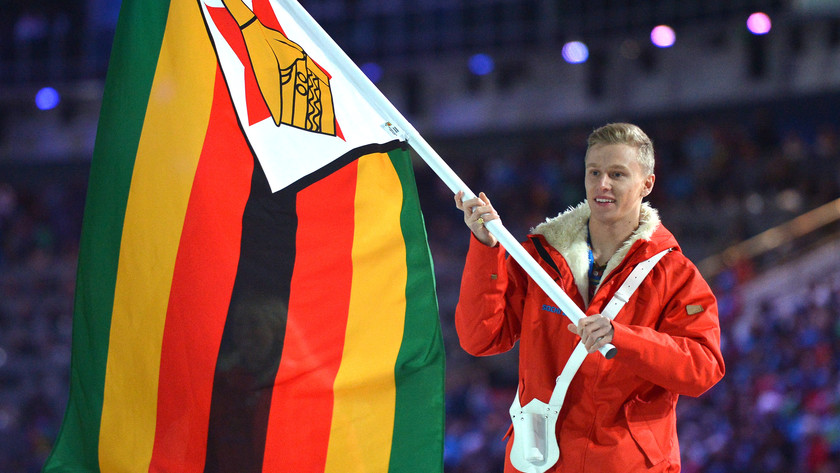This is about as cool as our team The Spirit of Panama who represented Panama in the Bobsled races. Here is the article by Christopher Spillane who wrote the Bloomberg Article.
Luke Steyn wasn’t born the last time it snowed in Zimbabwe. Still, that hasn’t stopped the 20-year-old skier from becoming the African nation’s first winter Olympian.
“I was born in Zimbabwe, it’s in my blood,” the University of Colorado business-management student said. “I’m African, even though I don’t sound like it all the time. Why not represent Zimbabwe? It’s unique.”
With a $1,500 monthly stipend from the International Olympic Committee, Steyn will represent a country with no official record of snow since it dropped its colonial-era name Rhodesia in 1980. His chance comes in the slalom and giant slalom at the Winter Olympics in Sochi, where he’ll be up against competition including Marcel Hirscher of Austria and Ted Ligety of the U.S., who are among the top-ranked skiers in the world.
More coverage of the 2014 Winter Olympic Games in Sochi
Zimbabwe’s sports achievements have been mainly in activities suited to its hotter climate such as swimming, cricket, golf and field hockey. Swimmer Kirsty Coventry, the nation’s most successful Olympian, earned seven Olympic medals and broke seven world records, while golfer Nick Price won three majors. Soccer is the nation’s most popular sport, although the nation is only 105th in governing body FIFA’s rankings.
 Source: Luke Steyn via Bloomberg
Source: Luke Steyn via Bloomberg
In the past year, Luke Steyn has competed at Chamonix and Courchevel in France, New… Read More
Steyn, born in the nation’s capital Harare, left Zimbabwe as a 3-year-old when his father, a former Rio Tinto Plc (RIO) employee moved to Europe. From there, vacations in the ski resorts of France and Switzerland led to his competing when he and his family moved to London in 2000.
Slalom Rankings
“It’s definitely what you’re exposed to,” Steyn, who lives with his parents in London’s Kingston upon Thames suburb, said in a telephone interview. “I was given opportunities to attend the academies, and from there I went from one thing to another, and I found myself competing internationally.”
Steyn probably won’t pose a threat to the elite skiers. He’s ranked 2,962nd in slalom and 1,711th in giant slalom, according to his biography on the IOC’s website. In the past year, he’s competed at Chamonix in France, New Zealand’s Coronet Peak and California’s Mammoth Mountain, where he finished sixth in the giant slalom. That was his highest position in 2013, according to the International Ski Federation.
Steyn will compete in Sochi’s Rosa Khutor Alpine Center, which was developed by ski architect Bernhard Russi. He’ll be facing competition from the likes of Austria’s Hirscher, the No. 1-ranked overall male alpine skier, and Ligety of the U.S., ranked third in the giant slalom by the governing body.
‘Unfair’ Sport
In the giant slalom, he’ll zigzag downhill through as many as 70 poles on a vertical drop of 450 meters (1,476 feet). Slalom is a shorter event with quicker turns and has a vertical drop of 220 meters.
“It’s one of the most unfair sports,” Steyn said. “You’re 55-60 kilos, skinny and you’re competing against 28-year-olds who have been doing this their whole life, it’s very difficult to get close to them.”
Steyn was the 10th Olympic carrier of Zimbabwe’s green, yellow, red, black and white flag at the opening ceremony. He succeeded Coventry, the flag-bearer at the 2012 Summer Games in London.
The similarities between Steyn and Coventry, 30, don’t end there. Both are from Harare and enrolled at U.S. colleges, training between classes. Steyn is currently taking a year off from his education, while Coventry graduated from Alabama’s Auburn University with a degree in hotel and restaurant management.
Coventry is a “huge inspiration,” Steyn said.
“What I think we can all learn from her is that it doesn’t matter if you are from a smaller sporting nation like Zimbabwe, you can still achieve top results on an international sporting platform,” Steyn said.
Steyn’s Team
He says he won’t be lonely in Sochi as a lone athlete.
“Being a one-person team will be strange for me, I have spent most of my skiing career on teams,” he said. “But I will have a coach, a physio, the chef de mission and my family there and hopefully a few supporters, so in that respect I will have a team to share the experience with.”
The country also is popular among other athletes, said Jessica Gregg, a 25-year-old short-track speed skater from Canada. Among athletes trading pins from their home countries, Zimbabwe will be target, she said.
“That would be pretty cool,” Gregg said. “I’m sure it’ll be highly sought-after, so it might be pretty hard to get.”
Cost, Exposure
For Winter Games athletes — especially those from non-typical winter sports countries — cost and exposure are the main barriers to entry, according to David Wallechinsky, president of the International Society of Olympic Historians.
“A lot of it has to do with money,” he said in a telephone interview from Sochi. “Anyone can run 100 meters or throw but winter sports are expensive. If you want to snowboard or bobsled, you need equipment, you need the venues.”
Steyn isn’t expecting medals at Sochi and is using the experience to hone his performance for future competitions. Although he moved to London in 2000, the year when Coventry first went to the Olympics as a 16-year-old in Sydney, he never really saw competing for the U.K. as an option.
Now he’s happy to be breaking new ground for his country.
“It’s easier to get exposed to summer sports,” Steyn said. “It’s unique in itself for a Zimbabwean to be exposed to winter sport. It’s been a funny journey.”
To contact the reporter on this story: Christopher Spillane in Sochi at cspillane3@bloomberg.net
